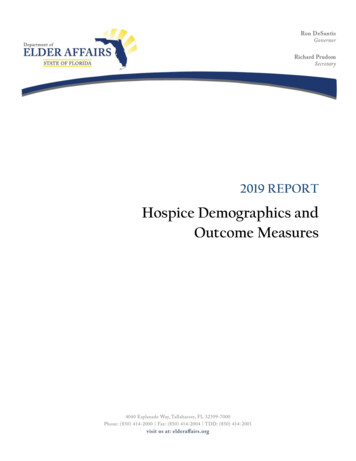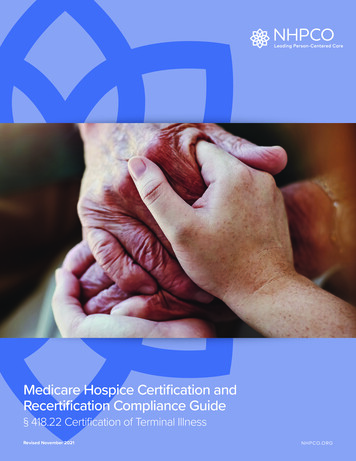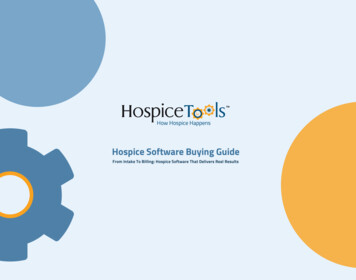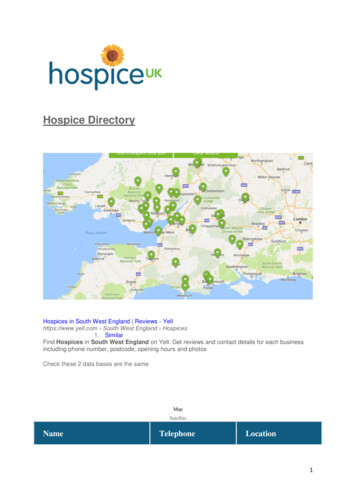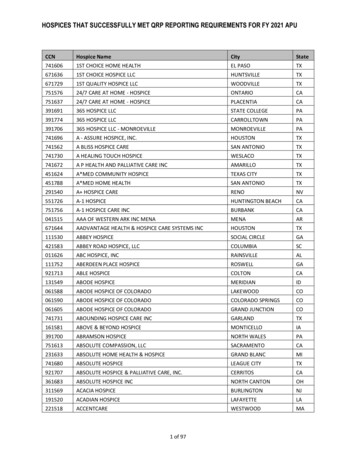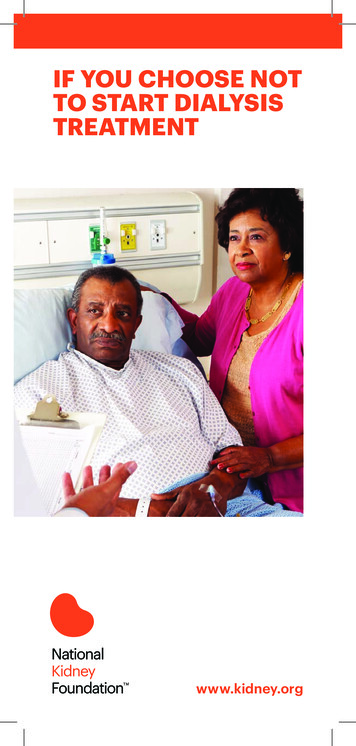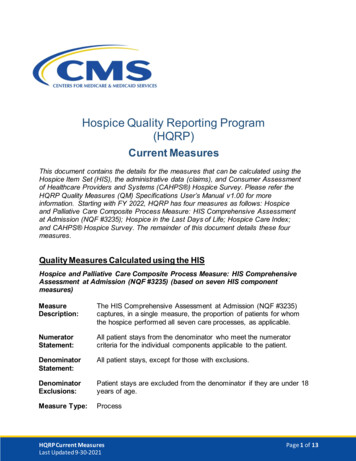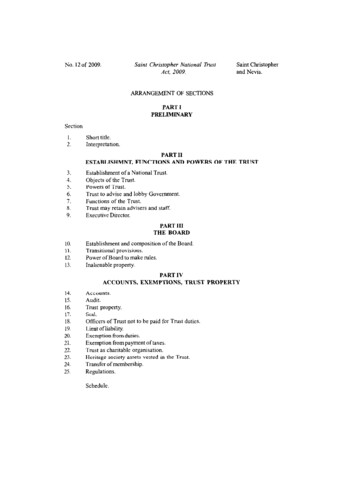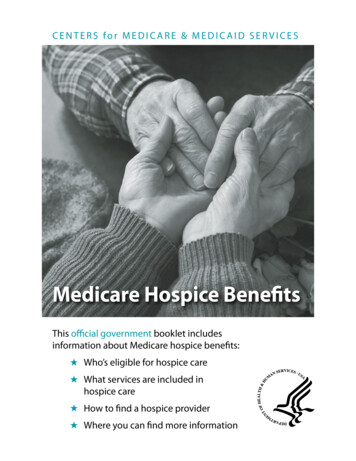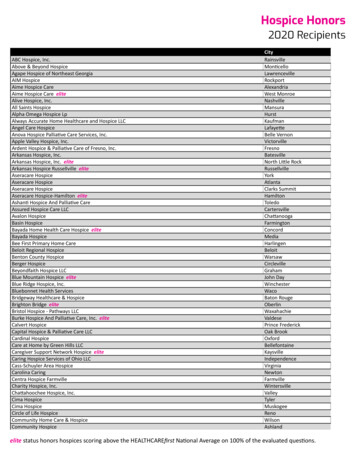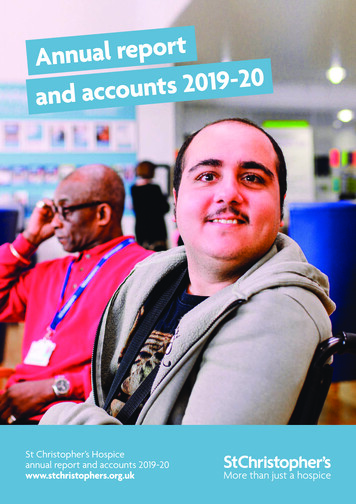
Transcription
troperlauAnn029102stnand accouSt Christopher’s Hospiceannual report and accounts 2019-20www.stchristophers.org.uk1
About’sSt ChristopherAt St Christopher’s Hospice (referred to as‘StChristopher’s’) our vision is of a world in which alldying people and those close to them have access tothe care and support they need, when and whereverthey need it.We were founded in 1967 by Dame Cicely Saunders and,over 50 years later, her words still remain at the heartof everything we do: “You matter because you are you,and you matter until the last moment of your life.”Each person is unique and we tailor our care to meetsocial, emotional and spiritual needs, as well as managephysical symptoms. Last year we provided care andsupport to over 7,500 people across south east London,both at home and in the hospice.We passionately believe that everyone should haveaccess to the best care at the end of their lives and weexist to relieve suffering for anyone with a terminal orlife-limiting illness. We provide bereavement supportand spiritual help and guidance for patients, those closeto them and our wider community.We’re actively involved in research around end oflife care, training health and social care professionalsand teaching students to become the palliative careexperts of the future. Through our extensive educationprogramme, we work with people across the world toimprove and develop hospice care.St Christopher’s Hospice annual report and accounts 2019-20ContentsAn introduction from our Chair, Morgan Jones3Our vision, values and strategic priorities5What we do with your money6Our year in numbers 2019/207Extending our reach9Driving innovation and new models of care12Maintaining and improving the quality of careprovided by us and others15Empowering the public around death, dyingand loss19Ensuring our long-term sustainability22Financial review24Independent auditor’s report31Financial statements34Notes to the financial statements38Looking ahead: our new strategy53A huge thank you to all our supporters56Who’s who at St Christopher’s58
omrfnoitcudortnAn isenoJnagroM,rour ChaiWelcome to the annual report and accounts 2019-20of St Christopher’s Hospice. Looking back over thelast year I am immensely proud of everything that theteam at St Christopher’s Hospice has achieved.We supported 7,592 patients and families, constructioncontinued on our new Centre for Awareness &Response into End of Life (St Christopher’s CARE,formerly referred to as the Learning Hub, see page18 for more information) and the high quality ofour care was recognised by our latest Care QualityCommission (CQC) inspection finding us to be‘Outstanding’.We’ve also invested much time and energy into thedevelopment of our Ambitions which will guide ourwork for the next three years. You can read moreabout these on page 53 and we hope you’ll give usyour support in making these a reality. Together, wecan make sure that everyone has access to the careand support they need at the end of life, whereverthey may be.Most notably, the team continued to provide supportthroughout the Covid-19 pandemic for professionals,patients and their families. They reached more peoplethan ever before.The high qualityof our care wasrecognised byour latest CQCinspectionEveryone from nurses and doctors to cleaners andadministrators went the extra mile to overcome thechallenges presented by Covid-19 and continue toprovide support for the 1,100 people under our care atany one time – even if that had to be done in new anddifferent ways.Our Care Teams continued to care for patients andfamilies on the wards and in the community, wearingPPE to keep themselves and the people they werecaring for safe. Every day, they put the needs of othersbefore themselves and, for that, myself and the Boardare extremely grateful.Our IT Team worked quickly to set up remote workingsoftware and prepare equipment, so staff whoSt Christopher’s Hospice annual report and accounts 2019-203
didn’t need to be on site could continue to workremotely. They also supported teams to completevideo consultations and virtual meetings using Zoom,reducing the risk of infection by connecting peoplevirtually.Our charity shop drivers teamed up with ourCommunity Action Team to deliver essential foodpackages and prescriptions for vulnerable people whowere social distancing to keep themselves safe andunable to leave their homes.Our Wellbeing, Education and Fundraising Teamsworked closely with the Communications Team tomove their offer online. Within days we were hostingvirtual fundraising events, providing virtual learning forhospital and care home colleagues, as well as onlinewellbeing sessions for patients and the wider publicon everything from mindful breathing to arts andexercise classes and gardening.This support and opportunity to connect meant agreat deal to so many, especially those who were livingalone and feeling isolated. Liz, whose mum, Betty,attended our virtual art class commented, “Thank youso much for arranging the Zoom art meetings. I cansee it’s bringing my mum, Betty, great joy just talkingto the group and the fact that everyone can chat andstay in touch is heart warming.”4St Christopher’s Hospice annual report and accounts 2019-20Of course, this is a snapshot of the many wayswe responded to the challenges of Covid-19 and,without the support of you, this wouldn’t have beenpossible. The outpouring of PPE donations whenwe couldn’t get supplies from the NHS; the financialsupport you gave to cover our increasing costs as weresponded to more people whilst facing the loss ofincome through closed charity shops and cancelledfundraising events; and the daily donations such asfood and hand creams for our staff to let them knowyou were thinking of them and appreciative of theirefforts kept us all going. I have been incredibly proudto be the Chair of St Christopher’s Hospice over thelast seven years, but never more so than in the lastfew months.Thank you, as ever, to staff, volunteers and supporters foryour ongoing commitment to St Christopher’s Hospice.Morgan JonesChair of Trustees
dnaseulav,noiOur visseitiroirpcigetstraOur visionOur values“A world in which all dying people, and those close tothem, have access to the care and support they need,when and wherever they need it.” Pioneering and boldThe vision of St Christopher’s Hospice is clear and everyday our staff and volunteers strive to make it a reality.To realise our vision we must be bold, innovative andpioneering and, to help guide the way, we developedfive strategic priorities for 2015-20 which haveinfluenced everything we have been doing (see below).Our strategic priorities for the next three years (202023), now known as our Ambitions, are on page 53.Our strategic priorities 2015-20 Of and for the community Empowering and compassionate One team working together Expert Stronger through partnerships.Our values are at the heart of St Christopher’s Hospiceand we strive to embody these in everything we do.Every staff member and volunteer works tirelessly toensure we provide the best possible care, reflecting ourvalues every day. Extending our reach Driving innovation and new models of care Maintaining and improving the quality of careprovided by us and others Empowering the public around death, dyingand loss Ensuring our long-term sustainability.Our values areat the heart ofSt Christopher’sHospice and we striveto embody these ineverything we doSt Christopher’s Hospice annual report and accounts 2019-205
htiwodewtaWhyour moneyWe are here thanks to the generosity of our supporters.Your kindness means that we are able to continue toprovide vital services to south east London and beyond.Where our money comes fromAn incredible 64% of our income is down to you; be thisthrough taking part in fundraising events, leaving giftsin Wills or buying goods in our shops. We are so verygrateful for the money you donate and are careful toinvest it wisely, in ways that will best serve the peoplewho need our support. We are also very thankful toEducation, fees andother income 0.9mInvestments 0.3mNHS 7.9mLegacies 3.7mthe local Clinical Commissioning Groups whose fundingtotals 35% of our income. This allows us to continueproviding care to people who live in the five boroughswe serve: Bromley, Croydon, Lewisham, Lambeth andSouthwark.Where our money goesIt cost 22.9m to run St Christopher’s Hospice in 2019/20.Here’s a breakdown of how we spent the money that yougave us. Please also see our full financial review starting onpage 24.Education 1.2mExpenditure 22.8m6Child bereavementsupport 0.2mRaisingvoluntaryincome 1.6mIncomeDonationsto fundour hospiceservices 4.4mCare at our centres 1.1m 22.9mShops andPersonal Care 5.6mSt Christopher’s Hospice annual report and accounts 2019-20Communitycare 3.9mInpatientcare 10.4mShops andPersonal Care 4.5m
srebmunniraOur ye2019/20Number ofpeople weprovided care andsupport for acrossour five Londonboroughs7,500 Number of staff*Number ofbereavementsessions deliveredto families andchildren2,537Number ofhome visits60214,237Number ofvolunteersNumber ofpeople whoattended one ofour educationevents1,200Number ofout-of-hoursvisits to patients’ andfamilies’ homes1,4322,054Number of peoplewho receivedsupport that wasdelivered by ourPersonal Care Team243*Including bank staffSouthwarkLambethCroydonNumber ofcountries weprovided educationand training toLewishamBromleyNumberof physicalrehabilitation sessionsdelivered273,061Number ofcustomers whovisited our 26 shopsNumber offollowers onsocial mediaNumber ofcomplementarytherapies deliveredThe cost everyyear to runour services is560,000 18,4641,793 23 millionOur hospicelottery raiseda grand total ofThe amountwe have tofundraise every year is 413,621 15 millionwww.stchristophers.org.ukSt Christopher’s Hospice annual report and accounts 2019-207
“Staff from the hospice havehelped us cut through a lot ofthe red tape and access supportfor our customers who are at theend of life”Kate and Liam work at a homeless hostelwe support in Croydon8St Christopher’s Hospice annual report and accounts 2019-20
Extendingour reachWe aim to support as many people as possible andtailor our care to meet people’s individual needs.Whatever support might be needed, we’re thereto help.Supporting people throughbereavementOur Bereavement Help Points launched in 2018 andhave been expanding ever since. We now have three inBromley, two in Lambeth and one each in Lewisham andCroydon. The Bereavement Help Points provide placesin the community where people can come to find outmore about bereavement services in their area and meetwith other people who may be experiencing somethingsimilar. Since 2018 the Bereavement Help Points haveprovided support and guidance for 846 people.St Christopher’s Hospice has been providingbereavement counselling to patients’ families for over45 years. Our Candle Child Bereavement Service extendsthis support to all children, young people and theirfamilies in the five boroughs we serve. In the last financialyear Candle received referrals for 257 families and 442children. Additionally, the service handled 334 calls frompeople seeking advice around childhood bereavementcounselling. Throughout the Covid-19 pandemic, theCandle service has continued to operate by providingtelephone support.Working with carersOver the last year, we have given increased priorityto the support required by carers of people with aterminal illness, in recognition of their vital role.One of the most pioneering aspects of this work wasthe development of a toolkit to provide improvedsupport for carers of dying people, who have norecourse to public funds. Working with our Welfare andSocial Work Teams, as well as carers in this situation, weidentified the significant challenges and dilemmas thesecarers face and identified new ways for hospice staffand others to support them. These findings are beingdeveloped into a toolkit which will also enable others toidentify such carers and respond to their needs. We arevery grateful to St. James’s Place Charitable Foundation,with the help of Hospice UK, for generously fundingthis work.In the course of the year, we responded to a requestfrom NHS commissioners in Lewisham to establisha telephone advice service for carers of people whoare dying within the borough. Since the service wasestablished in 2019 we have supported 187 people andare delighted that the NHS has invited us to continueproviding this service in the future.Making end of life care a priorityThe ‘Better lives, better endings’ project, funded byWomen in Fellowship and Octavia Housing, offers us anew opportunity to extend end of life care skills intosocial housing for vulnerable people. We have workedwith residents, their families and staff within Octavia tounderstand their aspirations around end of life and howthese can be best achieved. Drawing on these insights,we are creating training materials and other resourcesthat can be used by Octavia and other organisations tohelp their residents prepare for end of life and enabletheir staff to support them accordingly. This learningwill be disseminated via a conference at the end of theproject and be readily available through online resources.In partnership with University College London,St Christopher’s Hospice has been working to extendand improve end of life care for homeless people.The pilot project, which involves community nursesand social workers, is being trialled at two hostels inCroydon. Hospice nurses and social workers are teachinghostel staff how to identify and support people comingto the end of their lives. The intention is to use thisproject as a framework to support end of life care inother hostels for homeless people across the country.BereavementHelp Points haveprovided supportand guidance for846 peopleSt Christopher’s Hospice annual report and accounts 2019-209
Increased access to our expertiseOver the last year we have supported 862 peopleon our wards, made over 14,000 visits to people inthe community and welcomed people to over 9,000outpatient sessions at our sites; covering everythingfrom symptom management and gym sessions, tocognitive behavioural therapy and art therapy.Since 2017 we have experienced a 49% increase in outof-hours calls. In March 2020, we joined forces withMarie Curie to improve out-of-hours care for peopledying in Lewisham and respond to that growing need.The Rapid Response service is available overnight,seven days a week, 365 days a year. With 82% of peoplesaying they would choose to die in the comfort of theirown home (The National Survey of Bereaved People(VOICES) 2014), services like this one are vital, especiallyas hospital deaths in Lewisham are higher than thenational average at 52.7%. Through the partnership,St Christopher’s Hospice and Marie Curie aim to reduceA&E admissions and help people to stay at home, wherethe majority of people want to be.Increasing awareness of thehospice and its offerOur aim is that everyone who needs our support knowswho we are and how best to access our services andexpertise.With that in mind, we began talking to local people,through a series of high street surveys, about theirknowledge of the hospice and how we could improveawareness of our services in their communities.Based on those findings, and feedback from thepatients and families we support, the hospice brand wasrefreshed in the summer of 2019. Our new approachplaces emphasis on communicating clearly and avoidingjargon, using photographs of real people to give thepublic an honest and authentic view of our work andensuring our brand is used consistently, so postersand leaflets are instantly recognisable as coming fromSt Christopher’s Hospice.We hope these measures will help us to better connectwith people who need our help and those that cansupport us in our work.Our aim is that everyone who needs our support knowswho we are and how best to access our services10St Christopher’s Hospice annual report and accounts 2019-20
“Maintaining yourindependence is important,because when you’restruggling with all kinds oflimitations it can help bringa sense of meaning andpurpose to life”Wendy is one of our occupationaltherapists who supports peopleto improve their wellbeingthrough physicalrehabilitationSt Christopher’s Hospice annual report and accounts 2019-2011
dnanoitavonniDrivingreacfosledomnewWith people living longer and developing morecomplex needs, it’s crucial that we constantly find newways to care for and support the people that need us.Supporting people with frailtyOur frailty service, known as Bromley Care Coordination(BCC), continues to develop a new palliative approachto supporting people with frailty. The service enablespatients with an advanced illness to receive timely andcoordinated care in the community and continues togrow, this year exceeding its target number of referrals(600) by 6%.We want to share our knowledge and enable others toprovide good end of life care for people who live intolate old age. For that reason we have developed Cascade– a two-year project which aims to increase the qualityof end of life care for older people with severe frailty;generously funded by the Burdett Trust for Nursing.Through collaborative working between communitynursing and hospice teams, Cascade has identified keyskills for nurses in a variety of settings and, in the nextstage of the project, will identify key training resourcesto support the development and growth of theseessential skills and better improve care.Developing palliative care forpeople with heart failureSupporting people with advancing heart failure tolive and die well is a key area of focus for us. We arefortunate to have doctors and nurses within our teamwho have dual expertise in heart failure and palliativecare, as well as a nurse practitioner who is dedicatedto the support of heart failure patients and thedevelopment of related skills in the rest of the hospiceworkforce. They have been working with colleaguesin the local hospital and beyond, to shape and deliverservices that address the symptoms of heart failure,as well as end of life care needs. At the heart of thiswork are monthly multi-disciplinary meetings in whichhospice, hospital and community-based colleaguesdiscuss individual patients and how best to supportthem.In July last year, in partnership with our hospitalcolleagues, we ran a national conference on heart failure12St Christopher’s Hospice annual report and accounts 2019-20and end of life to share our learning from this work. Theconference was attended by 110 people and receivedgreat feedback. In response to the feedback received,and in partnership with the British Society of HeartFailure and King’s College Hospital, we have organised asurvey of practitioners across the UK on key aspects ofheart failure management and have developed a virtualnational community of practice. This draws in hospitals,hospices and community nurses who learn togetherabout this complex area of care.Dementia servicesDementia is now a leading cause of death in the UKdemanding that organisations, such as St Christopher’sHospice, respond proactively and comprehensivelyto support people with advanced dementia and theircarers. We continue to work with Memory Bridge, anAmerican organisation led by Michael Verde, focusedon addressing the social isolation that can arise fromthe disease. Michael’s visit in the autumn drew a varietyof audiences ranging from the public to professionalsin hospices and care homes to learn more about thisoften-ignored aspect of the condition.In addition, the hospice runs a virtual community ofpractice for practitioners in the south east of Englandaround dementia, as part of a national initiative ledby Hospice UK. This community meets monthly andcomprises other hospices, GPs, a local dementia huband a research centre. Within the hospice we havedeveloped a network of nurses working as DementiaChampions across our services to develop resources andskills to better support patients, family members andvisitors with dementia.This year we also launched a programme of support forcarers of people with dementia at home known as Carewith Compassion, which draws on trained volunteerswho deliver a programme of comfort and supportcalled Namaste. This is funded by a charity, Hope forHome, which is committed to enabling people withdementia to remain at home. The programme trained97 people in total across eight events in the last year,53 of those were from St Christopher’s Hospice and 44were external delegates.
Encouraging people to managetheir own careMaintaining independence throughthe wellbeing programmeAt St Christopher’s Hospice, we have been involved inthe 2019-20 Commissioning for Quality and Innovation(CQUIN) study from NHS England, which is looking forways to give people more control over their care – a keyfocus for the NHS in their long-term planning.St Christopher’s Hospice has always been about morethan just great medical care, we’re about helping peoplelive well and keep doing the things they enjoy. Keepingfit, being creative and recording their stories all play apart in this.The study at the hospice involved 50 people, who setthemselves goals related to regaining or improvingtheir activity, or alleviating symptoms such as pain andbreathlessness. For the first time in a palliative caresetting, we used a newly developed system to measurepeople’s success in achieving these goals.Our wellbeing programme remains very popular withthe people we support. The Living Well at Home Team,who provide support to help people manage dailyactivities at home, made 245 visits last year. Meanwhile,in our gyms at Orpington and Sydenham, we deliveredover 3,000 physical rehabilitation sessions.The new system was a success and, going forward, it willhelp us support and train clinicians to know when to useit as an aid to enabling people to play a more active rolein their care.Art sessions at the hospice are now open to everyone,with 322 sessions delivered last year. Patients, family,friends and members of the public come together toenjoy the creative process and share their experiencesthrough the mediums of paint, clay, collage and muchmore. The hospice continues to offer group and one-toone art therapy sessions.Working alongside the charity Hospice Biographers,the hospice now has a number of volunteers who havebeen trained to record the stories of patients. Storiesare recorded at broadcast quality and offer patientsthe chance to record their experiences for those closeto them and for the therapeutic benefit of telling theirstory.We want to shareour knowledge andenable others toprovide good end oflife care for peoplewho live into lateold ageThe Bereavement Support Team celebrated the oneyear anniversary of the Healthy Walks programme inOctober. Every Thursday afternoon a group of staff,volunteers and members of the community set offfrom the hospice for a lunchtime walk around CrystalPalace Park. Supported by Walking For Health, thisinitiative aims to improve people’s lives and their healthby encouraging simple daily exercise and socialisingwith others.St Christopher’s Hospice annual report and accounts 2019-2013
“[St Christopher’s]always [communicate]with patients abouttheir care and treatmentin a way they couldunderstand”The inspectors praising staffduring our recent CQC vsit14St Christopher’s Hospice annual report and accounts 2019-20
ehtgnivorpmidMaintaining anershtodnasuybeddivorperacfoqualityWe believe that everyone, regardless of theircircumstances or where they live, has a right to highquality end of life care. That’s why it is essential wecontinue to develop our services and offer educationand support to other organisations.Review by our regulatorsWe were delighted to receive an ‘Outstanding’ ratingfrom the CQC in early March, a fair and accuratereflection of the work that our staff and volunteersdo to ensure that people’s lives matter until their lastmoment.The unannounced inspection took place on 11 and 12December 2019. Inspectors spoke with a variety ofpatients and staff from all areas of the hospice; fromhealthcare assistants and orderlies, to welfare andbereavement support workers. The report recognisedthat we are outstanding overall, having been ratedas good in the categories of safe and caring, andoutstanding in the remaining categories of effective,responsive and well led.The inspectors highlighted the high quality of carethat we provide; the compassion we have for patients;the kindness of our staff and the clear and regularcommunication we have with patients to ensure theyare involved in decision making about their care.Identifying areas forimprovementUnder the guidance of our Director of Quality andthe Quality Governance Team, we have been workinghard to strengthen our quality governance processes.In April 2019 we launched our new Model of Qualitywithin the hospice, which has relevance for the wholeorganisation and not just the care services.Improving the care of service users has been a keydriver in the introduction of the Learning Panels. Thesegroups of multi-disciplinary professionals are used tolearn from a complaint or an incident. As a result ofLearning Panels, we improved the care of more complexpatients in care homes by ensuring their care is regularlyreviewed by a consultant; and changed our processfor receiving new patients by including all key teams intheir initial review.Quality improvement extends beyond St Christopher’sHospice. We have been working alongside our carehome partners to pilot a scheme that provides greaterclinical support by placing dedicated clinical staffin our Single Point of Contact team. This work islinked with a new initiative in Croydon which offerstelephone support to all care homes, so that their staffget immediate access to expert advice as necessary.Bromley CCG have since introduced the technology to10 of their care homes.Encouraging feedbackImprovements in care have always been supported bythe collection of patient feedback in our annual VOICESsurvey, but this year we trained several volunteers tocollect real-time feedback from patients on our wards.This feedback, collected within the first four days ofa patient’s time with us, has made it easier to addressconcerns and problems at the outset, rather than findingout about these weeks or months later following thepatient survey. One action resulting from feedback wasthe allocation of single rooms, when capacity allowed,to patients who requested greater privacy.To identify other areas for improvement, we askedpatients to provide feedback on our care environmentat both sites last year. This involved a number ofpatients and carers completing a questionnairefocusing on the impression given when arriving in ourbuildings and the cleanliness, tidiness, decoration andcondition of all areas including receptions, AnniversaryCentre, Caritas Centre, outpatient clinics, toilets andexternal areas. In response, we are looking to makeimprovements to our signage, decoration, artwork, toiletfacilities and heating of the reception area.Measuring our effectivenessIn the last year we have strengthened efforts aroundmeasuring and ensuring effectiveness – which we defineas an improvement in the health of someone, regardlessof their deteriorating condition. Such improvementscould include reduced symptoms, less anxiety ordepression. We have been working with Hull YorkMedical School to collect and analyse data regardingindividual patients in our care. This data allows us tomeasure aspects of their health and identify whetherSt Christopher’s Hospice annual report and accounts 2019-2015
we make a positive difference to them over time. Thegood news is that for many of our patients we do. Thestudy showed improvements in pain, breathlessness,anxiety and depression, which is a great achievementgiven how sick many of our patients are.Staff engagement and happinessOur staff survey in 2019 was facilitated externallyand benchmarked against 46 hospices across the UK.Although our participation rate fell slightly, we feltthat the responses remained very representative of thebroader workforce views. Importantly, scores were animprovement on the 2018 survey.Particular areas of note relate to the levels ofconfidence our staff have in both our Executive Teamand our Trustee Board. There were a few areas we willcontinue to improve in the coming year which include: staff health and wellbeing (with attention to workpressures/workload and increasing support available) performance management, namely consistency inperformance management, supervision and feedback reducing impact on the environment, demandingmore effort to use energy efficiently and to reduce,reuse and recycle waste greater use of technology to improve internalprocesses/systems improving communications across teams/departments.A series of projects and initiatives are taking place toaddress these issues, which are actively monitoredthrough our Wider Leadership Group.During the Covid-19 pandemic we have worked hardto maintain staff engagement and happiness. Weprovided staff and volunteers with 35 wellbeing sessionsproduced in the first few weeks of lockdown and madesure staff were kept up to date with organisationaldevelopments through a regular briefing.16St Christopher’s Hospice annual report and accounts 2019-20Developing our skills and expertiseDuring 2019 we held a number of organisation-widetraining workshops for managers and other keystaff, designed to support continuous improvementinitiatives across the organisation. We completed afull evaluation of the nine-month programme shortlyafter the programme came to an end. All 24 attendeesconfirmed they had found the development programmevery beneficial in improving their skills and/or theirconfidence as managers and leaders, and severaltalked about their desire to take on different or neworganisational responsibilities or duties followingcompletion of the programme.We have also developed and introduced a newAsso
rehabilitation sessions delivered 3,061 followers on social media 18,464 The cost every year to run our services is 23 . www.stchristophers.org.uk ark don y Lambeth wisham 20 *Including bank staff St Christopher's Hospice annual report and accounts 2019-20. 8 "Staff from the hospice have helped us cut through a lot of the red tape and .
